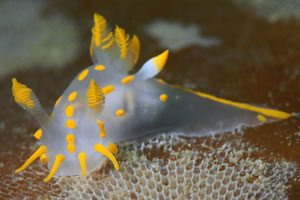
Polycera quadrilineata sea slug.
Far from just a place to share photos of funny pets and family holidays, social networks like Facebook are evolving into useful scientific tools, according to a new study.
Scientists at Essex have been investigating how Facebook is taking an increasingly important role in marine life research.
Social networks are a common way to share images, including images of wildlife that have been given tags by bird watchers, beach combers, divers, aquarists, shell collectors, and, most importantly, casual holiday makers that have seen something that has captured their interest.
By uploading and sharing these images, interested wildlife groups from around the world can access the collective knowledge of groups interested in the same field.
The project involved analysing 39,000 conversation threads from 34 Facebook groups where 14,000 marine species were mentioned.
Apart from the Facebook posts getting quick responses to help identify the images, researchers found that 93% were accurately tagged, making it a useful primary data source for conservation research. By analysing the text associated with the uploaded images it was also possible to map where different species live around the world, what they eat, what eats them and whether changes are occurring to their populations.
Leading researcher Jon Chamberlain, from the School of Computer Science and Electronic Engineering (CSEE), said: "Engaging a large audience via social networks to take an interest in marine conservation is crucial at a time of unprecedented loss due to human impacts. In comparison to other methods of ‘citizen science’, social network communities are a simple and exciting way for people participate in science and allows researchers like myself to try address these big problems with a different set of data.”
The research data have now been collated on website Purple Octopus, which allows researchers and conservationists to explore social network data in meaningful ways, without having to befriend someone on social media.
Essex has expertise in natural language processing and this inter-disciplinary research between CSEE and the School of Biological Sciences typifies the kind of challenges and impact that research in the new Institute for Analytics and Data Science at the University will have on society.
Ends
Note to Editors
For further information or photos please contact the University of Essex Communications Office on 01206 872400 or email comms@essex.ac.uk.